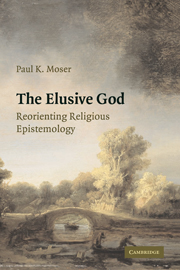Preface
Published online by Cambridge University Press: 29 July 2009
Summary
For better or worse, reflective people eventually face the question of whether God exists. Aside from one's preferred answer to that question, the immediate follow-up question concerns what evidence, if any, is available regarding God's existence. Undeniably, the divide between theists and atheists, past and present, has been deep and wide. It suggests, at a minimum, that God's existence isn't transparent to all reflective humans. The relevant available evidence is, it seems, less than obvious to all reflective people, or at least it doesn't make God's existence obvious to all such people. We might thus say that God's existence is at best elusive, subtle, or incognito.
God's existence is incognito, according to standard English dictionaries, if it is concealed or hidden from some people at some time for whatever reason. The term derives from the Latin incognitus, meaning “not known or not recognized.” If God exists, according to many able-minded adults, God's existence is concealed or hidden at least from them at some times. At those times, God's existence, we're told, isn't obvious to them or even beyond reasonable doubt for them. If God exists, then, God's existence is elusive, and disputable as well.
Three questions arise immediately. First, if God's existence is concealed or hidden, why suppose that God exists at all? Specifically, what are the prospects in that case for human knowledge that God is real? Second, if God exists, why is God's existence incognito, particularly if God seeks to communicate with people in some way?
- Type
- Chapter
- Information
- The Elusive GodReorienting Religious Epistemology, pp. ix - xiiPublisher: Cambridge University PressPrint publication year: 2008



